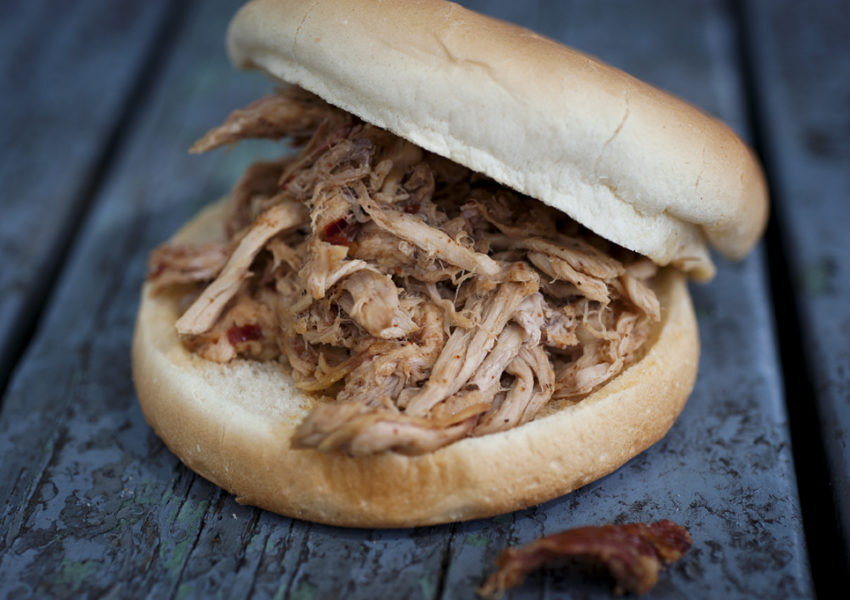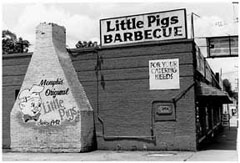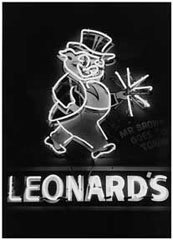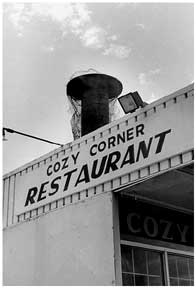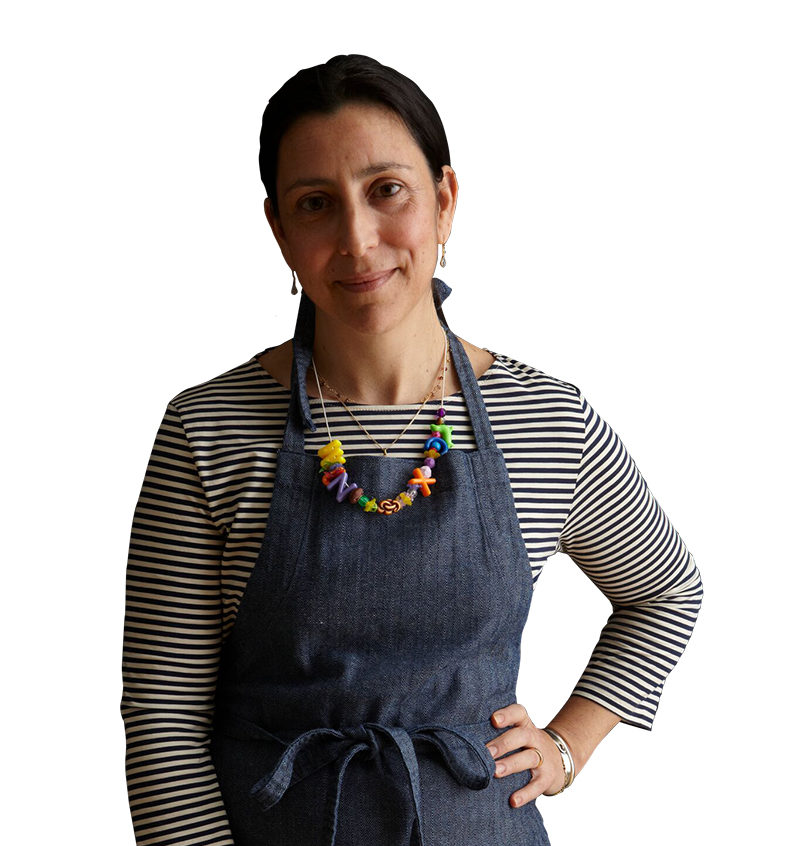< Back to Oral History project: Tennessee Barbecue Project
< Back to Oral History project: Rural Tennessee BBQ Project
< Back to Oral History project: Memphis Tennessee BBQ Project
ORAL HISTORY
Richard Leith and Jimmy Hopkins
Note: Two interviews appear on this page: Richard Leith and Jimmy Hopkins.
Oral History
SUBJECT: Richard Leith
DATE: March 21, 2003
INTERVIEWER: April Grayson
—–
April Grayson: Could you tell me your full name and where you were born and when?
Richard Leith: James Richard Leith. I was born in the county we’re sitting in, 1922.
In Henderson County, here.
Naw, Chester County.
Oh, this is Chester County. That’s right, this is Henderson town. Ok, how did you get started in the barbecue business?
Well, my father—I growed up in it, my father done it. Him and my uncle used to run a homecoming in Finger, Tennessee, and it started over there in 1890-something. Course, my father and uncle by marriage, they didn’t take over up until—see they wasn’t born. One of ‘em was born in 1882. My father was born 1891. They started having the picnic at Finger, Tennessee, homecoming first Saturday in August. I got taught to barbecue when they was a running it, after I got big enough, about 16 or 17 years old.
So have you ever owned a restaurant?
No, no. Sure hadn’t. I farmed and just used the barbecue as a hobby.
You seem to be really well known for it in these parts.
Oh, yeah!
So did, how did people find out about your barbecue and eat your barbecue?
Well, they come to the barbecue festival up here. They wouldn’t hear of nobody but made ‘em see after it in barbecue. We cook about 35 hogs.
And when is the festival? Is it still held every year?
Yeah, it’s the last week in September. Used to be in July, but it got so hot, we couldn’t take it. I told ‘em they was gonna have to move it to a later date, or I was a quitting it. Too hot on me.
How many barbecue people go to the festival and cook there? Or is it just you?
It was just me seeing after the three days and three nights of it.
Of just eating barbecue?
Yeah, 35 hogs.
And how many people does that feed over that three days?
Well, I guess it fed at least, I’d say five or six thousand people. You know, in the three day and night period.
And were they mostly from Chester County, or did they come from all around?
Oh, they came from…surrounding county, Henderson County and Hardeman County, Madison County, McNairy County, surroundings, you know.
Um-hmm, whole hog.
Open pit?
Open pit.
What kind of wood do you use?
Hickory!
How do you think that affects the flavor?
It puts the flavor in it. And I’ve got a sauce recipe that I got from my uncle and my dad, it’s a hundred years old, or maybe better.
And you still make this?
Yes, I make it.
Now, do you still participate in the barbecue festival every year?
Yeah. Sure do.
Are you passing on your knowledge to other barbecue people?
No, not yet.
You haven’t found the right person?
I’m 80 years old, be 81 in May. A lot of people—Liz run this place [formerly Friendship barbecue]. She had her own ways of doing anything. My way of thinking, that’s Elizabeth Kinchen’s sauce right there. My way of thinking, it ain’t nothing but vinegar and pepper….
So you have a different philosophy about sauce then?
Yeah. Good meat—good barbecue—and good sauce, you got something when you got ‘em both together.
 Can you share with me what makes a good sauce?
Can you share with me what makes a good sauce?
Yeah, if you won’t never let it get out.
(Laughing.) Well, you’re gonna be immortalized on the tape, now.
Well, I’ll tell you what I use. You want a get a pencil and paper? I’m getting old enough, I’ll…
Ok.
I use red ketchup.
Ok.
And I use half vinegar and half ketchup.
Ok.
And, put a little dab of Louisiana Hot Sauce in it.
Ok.
And you can put sugar in it, white sugar.
Ok.
And I put margarine in it.
Margarine? Ok.
Alright now, what’ve I told you?
You said half vinegar. Is that white vinegar or apple cider vinegar?
No, apple.
Apple. Ok.
I use the colored vinegar.
Ok. And half ketchup.
Half vinegar and half ketchup, and you might—to thin it down just a little more, you might have to add just a little more vinegar to it.
Ok.
Not have it too stiff, the body of it. You understand what I’m trying to tell you?
 Yes, sir. And then a little dab of Louisiana Hot Sauce?
Yes, sir. And then a little dab of Louisiana Hot Sauce?
Um-hmm.
And some white sugar.
White sugar. Red pepper, pulverized.
Ok.
Don’t put no red pepper in it’s got seed in it.
Ok.
Cause it’s in your way. Just red pulver[ized.] Lot of people puts black pepper, but I don’t put black pepper in my sauce.
Ok.
I sure don’t.
And you use—how much margarine do you use? Just a little oiliness?
Well, now, I put about, say 25 gallons, or 20 gallons, I’m gonna make it 20 gallons, I put about four pounds in there.
Ok.
I’d say about 5 gallons of hot sauce, put you about a pound and a half of margarine in there.
Ok.
A lot of people puts brown sugar, but I use white sugar.
Just a little bit, or a good bit?
And then when I get it, when I get it mixed up, I cook my sauce. Make it come to a good simmer for about an hour or about maybe and hour and a half.
Ok.
And then you’ve got something.
Ok. That sounds delicious. Have you ever cooked on a cooker, or only over the wood?
No, only with open pit and…
Jimmy [Hopkins, owner of My Three Sons Barbecue] says it’s not barbecue unless it’s over wood. Do you agree with that?
Now, what? [Leans in.]
Jimmy says it’s not barbecue unless it’s over wood. So you agree with that, huh?
One hundred percent! [Laughs.]
Do you think there’s anything special about this Chester County area and its barbecue?
Chester County is the barbecue capital of the world! (pauses) I’m telling you just like it is.
Ok. What do you think makes—how do think that tradition got started here?
Liz got started here?
No, the tradition in Chester County.
Go right here about six miles, they started out there at the early age about the time my father and my daddy (sic) started at Finger—that I was telling you about ‘while ago.
Yes, sir.
They’d go over there and get a…big colored man. His name was John Cawthon.
John Cawthon?
Cawthon. C-O-W. How do you spell Cawthon?
Uh, C-O-W-T-H-I-N or something like that?
Naw, that ain’t it. C-A-W. Anyhow, it’s Cawthon, Cawthon. I can get a phone book and get the phone, I mean, the right name.
Ok.
There’s three generations of Cawthons that’s cooked in—my father and uncle, and three of ‘em, the Cawthons…. There’s one here works for the county, but he don’t, he don’t do no cooking. There’s one of ‘em left—one of Raymond’s boys. John’s cooked for my daddy and all, and Raymond Cawthon cooked for me and my daddy and brothers. And Rayford—he’s Raymond’s boy—he’s cooked for me up yonder at the, at the barbecue festival. Three generations of Cawthons.
And do you think they were, that family has been important in keeping that tradition going?
Yeah, yeah. They failed this time having the barbecue. But it’s left out there in that grove, across from C&R Grocery. You ever been out there?
Right, right, right.
Right across there, the man left it that way. They could have the barbecue the first Saturday in September. It’s been going for years and years. And that’s about all I know.
So, three generations ago, they’re the family that kind of started it in this area?
Well, they was out there when my dad and uncle went over there. I was about a five-, six-, seven-year-old boy. I’d go out there with my father and my uncle, seeing about getting John to cook for the picnic the first Saturday in August.
What’s special about their cooking?
Well, they just knowed how to handle it. They knowed how to do it. They’s good.
Really. Now did they make their own sauce and stuff like that?
Yeah. But they never made no such sauce as I just give you the recipe.
Ok. (laughs) I’ll have to try it. I’ll try it.
They never made sauce—theirs is mostly vinegar, and it was hot. They made it cheap, you know. It costs you a little money to make this sauce I give you the recipe on.
And you don’t do mild or hot? You just do this one sauce?
Do it—you do it like you prefer, like you like mild or hot either one. You can mix, take up some of it and make it a little hotter. You ain’t gonna have a whole lots of calls for that hot sauce, real hot. Most people wants it mild.
Right. Well, what kind of folks eat your, generally tend to eat your barbecue? All different kinds of folks?
Gosh, yeah! Man, I tell you, they’d line up—they had three windows up there, at the court square. And they wouldn’t stop ‘til it was gone. ‘Course now they had ribs, and they had chicken, and people was a wanting that barbecue and the ribs and chicken. ‘Had a great big tent up, up by the old courthouse. People would come up there and sit down there and eat it.
When you say court square, is that where they have the festival?
Yeah, right up there on Main Street.
Do people ever ask you to have it more than once, once a year, or just—
Naw, it was just one time.
Just one time a year?
But we had an awful bad year, it was storming, that year. Bad. It was tough, I don’t mean! We got cut down on the hogs, seven on Wednesday, seven on Thursday, seven on Friday. Twenty-one hogs.
You lost twenty-one hogs?
Naw. Sold ever bit of it.
Oh, sold every bit.
But cut back on account of the weather being so stormy, and it just raining, just coming down in sheets.
But people still came out, huh?
Yeah.
What year was that? Do you remember?
Last year!
Last year, ok.
2002!
Ok. And you’re planning to do it again this September?
Well, now, I don’t know whether I’ll be able or not. I just, I can’t say about that right now.
Who do you think would take over for you?
I don’t know. (Laughs) They’ll have to find someone.
Well, if you could pick a successor, who would you pick? Who do you think does the best barbecue?
I don’t know. It’s just got about to road’s end—I’m telling you just like it is.
So you don’t think that the barbecue around here is as good as it used to be?
Yeah, in a way, if you handle it right. I think he’s gonna do alright. [Gestures to Jimmy Hopkins, owner of My Three Sons Barbecue.]
You think Jimmy’s got the best chance?
I’m a, I’m watching him. Every once and a while, I’ll come in there, and I say, “Let me see that barbecue.”
What about some of the other local folks like Bobby’s and Joyner’s and places like that?
Electric cook. I mean, Bobby’s place is cooked with wood.
Right, right.
Joyner’s down there is electric cook. There’s one right down the road here that’s electric cook. That’s his son-in-law, Joyner. This Joyner married a—what’s his name down here? [Jimmy responds, “Bill Latham.”] Yeah, Bill Latham. That’s Bill Latham’s son-in-law, Joyner is.
Oh, ok. So you think Jimmy stands the best chance, huh?
Yeah.
Ok, well—
He’s gonna do alright, if he’ll stay with it.
Well, what about sides? Do you serve slaw with your barbecue, or how do you—
Oh, yes. You got to have slaw.
Do you like red slaw like other folks around here?
Well, a lot of people likes red slaw, a lot of people likes white. That undertaker [an earlier customer], he wanted white slaw. You have both calls. Mostly red, though—two-thirds or more, my way of thinking.
Mostly red around here? That was something I wasn’t familiar with, red slaw. I grew up on white slaw. What about other kind of sides? Do you do beans, potato salad?
Naw, mostly baked beans.
Mostly beans.
I don’t fool with that potato salad. But a place like this, where they come in to eat, it’s alright, potato salad. It’s alright. Fine and dandy.
Now, have you ever done barbecue contests?
Yeah, Jackson one time, I believe. But we never got up there ‘til late. I think I won second place, up there. But we never got there ‘til late. Didn’t have everything just exactly like I wanted it, to really get out there and win.
Right, right. Well, anything else you want to tell me about barbecue in this area?
There ain’t really nothing—you just got to know what you’re doing.
Transcript (Jimmy Hopkins Interview)
SUBJECT: Jimmy Hopkins
DATE: March 21, 2003
INTERVIEWER: April Grayson
—–
 April Grayson: Jimmy, could you tell me your name and the name of your business?
April Grayson: Jimmy, could you tell me your name and the name of your business?
Jimmy Hopkins: My name is Jimmy Hopkins. I’m the owner of My Three Sons Barbecue.
Could you tell me when and where you were born, just for the record?
I was born in Savannah, Tennessee. I don’t know why my mama went over there and had me, but…what else?
When, the year?
In 1957. I’m a classic.
—–
Could you tell me how you started with your business? You told me it was new, but could you give me a little background on how you got into this business?
Me and my dad had barbecued a lot of hogs. I mean, not a great number of ‘em, but people talk about how good it is, and I’ve always wanted to be in the restaurant business. So I had the opportunity to take this one over, so here I am.
And you bought it when?
I bought it around the first of the month, whatever this month is.
First of March, 2003?
Yeah.
So this is brand new, then?
This business is, yeah.
And it was formerly owned by?
Liz Kinchen.
And it was called?
Friendship’s.
So, who taught you to barbecue? Was it your father?
Yeah, um, I’m pretty much doing it the same way they did here because the meat, the meat is really good here. It is exceptional, tender.
What’s the method you use here?
I really can’t tell you. If I did, I’d have to kill you.
(Laughing) But you use whole hog?
Use whole hog.
And do you use open pit, or—
Well, they got hoods on ‘em, but they’re open, yeah. Basically, they’re open pit, yeah.
So is this different than the way you grew up learning to barbecue?
No, it’s pretty much the same, it’s just, it’s a little different method. Where we used to sit up all night, I don’t have to sit up all night now. They’ll cook theirselves at night.
So what’s your specialty here? What’s your specialty?
We have barbecue, then we have chickens and baby back ribs on Thursday.
So you have a pulled pork sandwich, is that the kind of thing?
Pulled pork, or if you love it to have it chopped, I’ll chop it up for you.
And what about sauce? Do you make your own sauce and serve sauce?
Yeah, we make our own sauce. I make a mild sauce, and I make a hot sauce. It’s almost nuclear.
Nuclear?
Um-hmm. (Laughs)
What other kind of sides do you serve?
We have baked beans. They’ve got a lot of meat in ‘em and some other goodies. And we have a white slaw and a red slaw, and potato salad.
Do you serve the slaw on the sandwich?
If you want it. Or on the side.
So people have the choice of white or red?
Yep.
Is the red ketchup-based?
Yeah, it’s ketchup. There’s no vinegar in it. You know, a lot of people make, they make it out of vinegar, but we make it out of, it’s ketchup and barbecue sauce. Brown sugar.
So what kind of fuel do you use? Do you use wood?
I use a blend of wood, but basically hickory, but I don’t tell what all I use.
Ok. So you—
It’s a, the other blend I use, it puts kind of a sweet taste to it. It’s just a different flavor. It tastes good!
Where do you get your wood, from the lumber mills around?
I’m getting it from a handle factory. What I’ve got now come from a handle factory, but I’m not planning on getting any more from ‘em because it’s too expensive. I’m gonna get it from sawmills where I can just go get it myself. It’s basically free.
Do you think that—I know several barbecue places around in this area use wood that they get from the lumber mills. Do you think that’s why people continue to use wood, or do you think it’s more about the tradition?
barbecue is supposed to be on wood. If it’s cooked with gas or electric, all it is is roasted pork. You can put a smoky flavor in it by adding a smoky liquid to it, but ours has got the real smoke. It’s the real thing. And that’s they way, that’s the way barbecue has always been made, is with the fire. Now, most people’s going to gas because you can control the heat so well, and you can make it tender with gas, but it’s not barbecue. It’s roasted pork. (Laughs.)
So that tradition is important to you?
Yeah. I mean, I want something that people will really enjoy. And I don’t sell junk. If it gets down to where it’s junk, I ain’t gonna sell it. I’ll throw it away. I’ll throw probably five to ten pounds of meat out of every hog, and the hog don’t produce but like 35 pounds of meat. That’s all it produces, ‘cause the fat cooks out of it.
How much does it weigh when you start?
These that I’ve got average about 180 pounds, dressed. So they’ll weigh probably 300 before. They’ll top usually around 220 to 270. But they’re already—all I have to do is go pick ‘em up. We raise hogs, but I basically just go get ‘em because they’re so easy to just go get.
Where do you get them?
In Lexington.
At?
It’s a meat market.
At Hays?
Hays, yeah. I think that’s where just about everybody’s comes from. See they inspect ‘em there, and you can’t cook ‘em if they ain’t been inspected.
We’re gonna be talking to the Hays folks tomorrow. So how do you think your—do you see your new business fitting, continuing that tradition in this region as opposed to other regions?
As long as I can get wood, I’m gonna do wood. If all the trees die, I might have to go to something else. Before long I’m gonna be doing bologna, too. I’m gonna have the barbecued bologna at dinner. I have a lot of requests for it, so I’m gonna try to do.
And that’s something new that Liz didn’t do before?
I don’t think so, no. I’m in the process of doing a barbecue salad. Boy, it’s good!
What is that—what does that mean exactly?
Well, it’s just like a salad with barbecue on it. And I can lay down and wallow in it, it’s so good.
(Laughs.) So what do you think makes your barbecue here at this restaurant distinctive from the others in the area?
It’s just the way that we cook it here. It takes about 24 hours to cook a hog. The slower you cook it, the more tender it’ll be, and the more flavor it’ll have in it, because it’ll sit there and just kind of boil in that grease in there. And it just makes it real—it’s like cooking something in a slow cooker. You can take a tough piece of meat and put it in a slow cooker, and it’ll be tender.
Have you ever owned a restaurant before?
Unh-unh.
This is your first one. What about your clientele? Is it pretty much the same clientele that was loyal to Friendship before you took it over?
Um, yes. Yes. I’m getting some customers back that, uh, they quit coming down here for reasons I won’t discuss.
Ok. But they’re returning now?
Yeah.
Are most people locals, or do you get—
No, we have—they come from everywhere! But it’s just, if you got a really good product, the word of mouth is the best thing you can have. See we have a lot of customers from Freed-Hardeman [University]. See all the barbecue that Freed-Hardeman eats comes from this place here. I don’t know if they want anybody to know that or not, but they’ll get as high as five whole hogs at once. If they’re wanting to impress somebody, they’ll come get barbecue. There used to be a lot of people that’d eat down here from Freed-Hardeman, but they got mad and left.
Ok.
We’ll leave it at that. I don’t want to jeopardize nothing.
I understand. So how do you see the future? I mean, you’re just starting out, so how do you see the future?
It’s getting better every day! I really enjoy it. I love dealing with people. I really enjoy dealing with people! And I like to hear people say, “Boy, this was good.” And I’m trying to get it cleaned up to where people will come in and sit down and eat. Because I like to talk to people. I like to watch ‘em eat! (Laughs.) I like to watch people eat. Food that you know that you made, and people really enjoy it.
So the atmosphere of the restaurant is really important to you?
Oh, yeah. Absolutely. When I took this over, there were signs in here everywhere, just negative, negative mess. And I tore it all down because I want people to feel welcome when they come in here. I really, I want people to come down. That’s my goal. The more, the merrier.
Do you have a long-term plan, or do you just kind of take it a day at a time?
barbecue is my main thing, but I’m trying—see I’ve got another room on the other side of that wall there that’s about the same size as this. And I plan on having a buffet lunch before long. I’m gonna do…country sausage, country ham, and homemade biscuits, all that stuff.
Good!
We make a sausage that’s just out of this world, it’s so good.
Do you make that yourself?
Um-hmm.
What, um, do you run this place by yourself? Do you do all the cooking yourself?
I do all the cooking myself.
So, what’s your typical day like? When does it start? What’s the—
I start at usually around 5:00 in the morning, and I’ll quit about 11:00 at night.
Doesn’t leave a lot of time for anything else, huh?
And I’m getting kind of tired. This is my new home. (Laughs.)
Do you think that will change? Are you gonna hire people to help take some of the load off?
My three sons, I’m hoping, is gonna help me. They’ve all got jobs, but as it progresses to getting better, where we can make more money, I’m hoping that they’re gonna be able to help me more.
Ok, great. And how old are they?
My oldest one is 25. [He turns and talks to a customer. “Thank you, Fentress. Come back! Bring your wife next time. Hey, I’m gonna cook you some ham one morning.”] But I think they’re wanting to help me some, but I just can’t afford to, to do a lot right now. Everything right now is going out the door. But it’s doing ok. I’m really enjoying it.
So you think, sort of long-term, this might be a place you would want one or more of your sons to take over eventually?
Oh, yeah. See, I would like to have a franchise. And at least have one of ‘em a piece for my three boys, and maybe one for me, too. But, that’s what I’m planning, whether it happens or not. It might not, but, hey, stranger things have happened.
Do you have any particular philosophy of barbecue? I know you talk about the tradition and that barbecue is not barbecue unless it’s on open, on wood. Any other philosophies?
Uh, not really. Just make a good product. If you build it, they’ll come.
What about Mr. [Richard] Leith [noted local barbecue master]? Have you known him long?
I hadn’t really knowed him that long. He, he comes down here a lot. He’s a older fellow, and he just likes to hang around barbecue places because, you know, it’s always—I guess the feeling’s always there. You know, once you smell the smoke, it’s in you.
That’s great. Well, any other things you want to talk about? Otherwise, it’s been great.
I’ll just, not really, I just thank you for coming by and talking to me.
Thank you.
Thank you.




